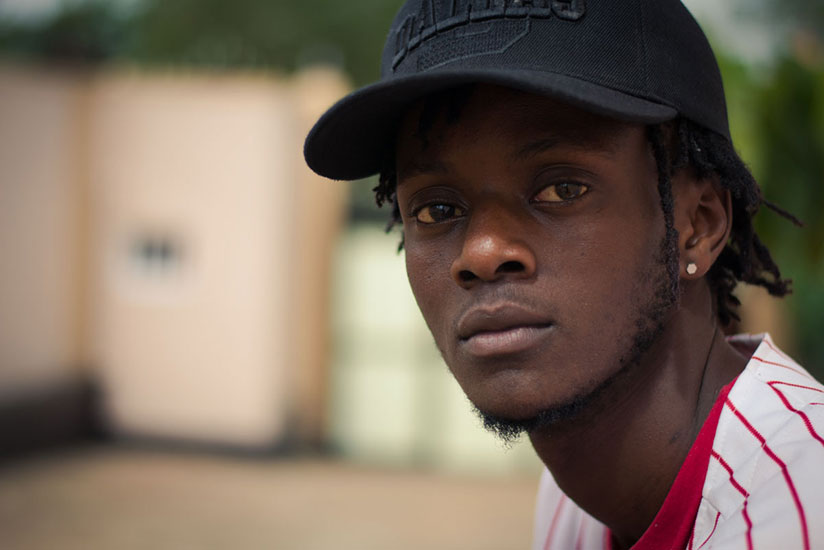Lebron Isaac was born and raised in Kigali by a single mother. He came into this world on August 28 1994, just as the nation recovered from the wounds of the 1994 genocide against the Tutsi. He is the eldest among three siblings.


Lebron Isaac was born and raised in Kigali by a single mother. He came into this world on August 28 1994, just as the nation recovered from the wounds of the 1994 genocide against the Tutsi. He is the eldest among three siblings.
But there is another reason he describes the period of his birth as "a bad season to my parents and to me.” His father was killed during the Genocide, just a few months before he was born, so he never got to know his father.
"My mother struggled a lot to raise me from the time I was born,” he says with a rather heavy voice. Still, he believes that he and his mother were "so blessed for the life we were living”.
For his primary school, Lebron went to ESCAF before proceeding to Groupe Scolaire du Mont Kigali –APACE for his secondary education.
"My life wasn’t good at all because of the problems that I was born into caused by the loss of my father,” he hastens to add.
Finding solace in dance:
As the years went by, Lebron’s attention and passion started drifting toward dance, to which he started devoting increasingly more time.
"I had been living my whole life with my mother only. All those years, I did not engage in any other sports or games except sneaking out to see other people dancing.” However, he was just a little boy watching much older boys, so he failed to muster the courage to join in on the dance sessions.
"I was very afraid of them that time because they were older and bigger than me. So I started by watching people dancing and thereafter practicing what I had seen at home alone.”
It was these practice routines, plus the dance videos he watched on YouTube, that would bring him closer to perfecting his favourite art.
By the year 2007, he felt confident enough in his abilities and started showcasing at every opportunity that came his way.
"My feelings for dance just kept growing until I had to start doing it publically. Dancing wasn’t something that someone came and told me or ordered me to do. It was a power that came naturally. I don’t even know where that feeling came from.”
"Sometimes people are naturally talented. Since my mother started hearing that I started dancing she wasn’t happy. Every time I went for practice, she got mad at me because that time, dancing was still viewed with suspicion but I had that unyielding push in me.”
The self-taught dancer he is, Lebron did not benefit from any formal dance classes or workshops at that initial stage;
"My only class was downloading tutorials of all the dance moves that were interesting to me. I started out dancing many styles but eventually I settled for three; Dubstep, Hip-hop, and Afro House and my mission has always been to become a professional in those three types of dance.”
He still vividly recalls the initial days of hitting the dancing stage.
"My first feeling was that of excitement; excitement to show what I had learned, and the real physical definition of music. I had that confidence to express myself and I was always happy which makes me laugh whenever I’m dancing which really looks good.”
Today, Lebron spends a sizeable chunk of his dancing time teaching dance to children and under-privileged youths at places like the Kimisagara One Stop Youth Centre and SOS Children’s Village.
"It wasn’t easy to develop my own career. Every time I wanted to go for practice my mother would confront me and tell me ‘you should be doing some work at home. Other times she would tell me to invest my time in worshipping God. So I give my time to other young people because I know that some parents do not understand how powerful talent is.”
"The most important thing I would like to share with people who do not understand dance or any other form of talent is to stop labeling ability as talent. Instead, we should think of other people’s ability as skill. If someone is good at something they’re skilled. By calling talent skill, you tell yourself that what you’re seeing, hearing or reading is learnable. Dancers practice to get skilled, they practice and practice and practice some more. So long as you have both arms you can be skilled too if you follow suit.”
He performed in the first Primus Guma Guma Super Star competition where his crew backed up the music group TNP.
"At that time, we did a great job on the stage where no one was expecting it,” he explains.
That good performance earned him another deal in this year’s PGGSS competition that was won by the boy group, Urban Boyz.
"Our performance this year was a bit different because we danced alone with no artistes on stage, which I believe was a good sign of respect for the dancers.”
He has also performed at the Peace One Day Youth Celebrations and in the Onstage Dance Competition.
"My dream is to change first of all the mentality of those who took at dancing as a hobby but it’s a skill. I will improve my physical and mental practice and always try to learn to know what to share with those I inspire so that people can figure that dancing is a gift and a talent. I have a good heart of sharing what I know with those who don’t, I have a dream to open a dance studio and I can’t give up on what I started.”
editorial@newtimes.co.rw


